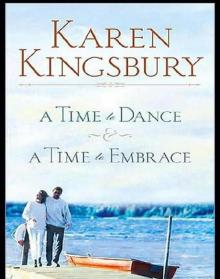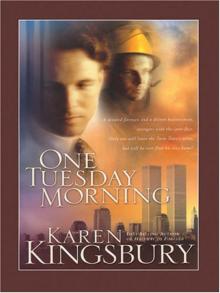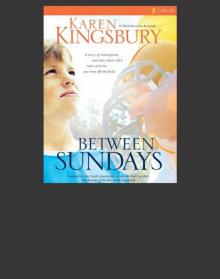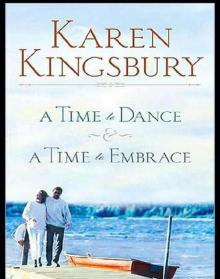- Home
- Karen Kingsbury
The Tuesday Morning Collection Page 10
The Tuesday Morning Collection Read online
Page 10
Dear sweet Jamie,
I have this feeling, deep in my heart, that something's about to change for me and you. Maybe it's your questions about church or the way you seem to hang on to Sierra's Bible stories a little bit longer these days. Whatever it is, I've prayed for God to touch your heart, baby. He means everything to me, and I know that one day He'll mean everything to you too. On that day, you'll no longer have to be afraid, because you'll have God Almighty to lean on. I want you to know, honey, that when you find that precious faith, I'll be smiling bigger than you've ever seen me smile. Because the thing I want even more than your love is the knowledge that we'll have eternity together.
I simply cannot bear the idea of being in heaven without you. I love you too much to lose you.
Jake kept writing until he'd filled almost two pages. Then he closed the journal, closed the Bible, and slipped them both beneath the bed. He leaned down and nuzzled his face against hers. “I love you …” His whispered words caused her to stir, and slowly she opened her eyes.
“Mmmm.” She pulled her arms from under the sheets and caught the back of Jake's head. “C'mere.”
Jake grinned. “Gladly.” He positioned himself partway over her body and kissed her more fully this time. When he drew back, desire burned in both their eyes. “You're gorgeous, you know that?”
“Not as much as you.” She kissed him again and moved the covers off her pajama-clad body. “Come back to bed.”
“Don't tempt me.” Jake could feel his body responding to hers, and for a moment he considered it. Then he kissed her once more and sat up. “I need to shower. Shift change is in an hour.”
“Oh, Jake, come on.” Jamie sat up and worked her hands along the sides of his naked chest. “Call in sick. It's a beautiful day. We'll play under the covers for an hour and take Sierra to the zoo.”
Most workdays Jamie barely woke up to tell him good-bye, and so her request was almost too much to pass up. He eased her back onto the bed, gave her a series of kisses, and then forced himself onto his feet. “One of the day guys is sick this week.” He brushed a lock of dark hair off her forehead. “Otherwise I would.” He looked out the window. “Besides, the good weather is supposed to last.”
“Next week, then?”
He grinned and stretched. “Okay, next week. Unless someone else gets sick.” He turned toward the bathroom, his tone still filled with the passion he felt for her. “I better shower.”
“Okay.” Jamie exhaled her disappointment. “But, Jake, one thing.”
He stopped. “What?”
“About that shower …” A grin filled her face. “Make it a cold one.”
Thirty minutes later, Jake was dressed in his work uniform—black pants, a white T-shirt and short-sleeve buttoned-down, black socks, and comfortable dress shoes. His turnouts—the uniform he wore for fighting fires—stayed at the station near the rig. Ready at a moment's notice whenever they got a call.
He kissed Jamie one last time. “See you tonight.”
“Chinese food?”
“Mmmm.” He started to smile but changed his mind. “Wait … are you cooking?”
She giggled and placed the palm of her hand against his chest, pushing him playfully away from her. “Go to work, you big oaf. I can cook Chinese food just fine.”
“Okay.” He took a step toward the door and raised an eyebrow. “But keep the takeout number handy. Just in case.”
Her laughter faded. “Hey.”
“Yeah?” He spun around, and his eyes found hers. The connection between them was as deep as it was instant.
“Be careful.”
He winked at her. “You know it, Jamie. I love you.”
“Love you too.”
Before he left, he stopped by Sierra's room.
She was up, moving about near her closet. So far she'd managed to pull on pink leggings and a blue-and-red-striped shirt. At age five, dressing herself was the ultimate in independence and proof, if nothing else, that she was Jamie's daughter. She saw Jake and ran to him, hugging his legs tight, and stirring feelings in his heart that made a day at the zoo sound wonderful.
He swept her into a full hug and then set her down again. “Isn't this pretty, Daddy?” She did a twirl. “Mommy says I have to pick colors that go together. Pink, red, and blue go together, right?”
Jake bit his lip. “Right, baby. Definitely.” He crouched down and rubbed noses with her. “Daddy's running late, honey. See you after work, okay?”
“Butterfly kisses first.” She moved her face so that their noses rubbed together, then she turned her face a few inches, and at the same time they brushed their eyelashes against each other's cheeks. She pulled back and grinned at him. “There. Now you can go.”
“Be good.” He hugged her once more. “And don't forget to pray to Jesus.”
“Okay, Daddy. I love you.”
“Love you too, sweetie.” He stood and blew her a kiss.
She pretended to catch it in the air and place it over her heart. Then she blew one in his direction. Jake grabbed at a handful of air. “Caught it!” He brought his fist to his chest. “Forever and always.”
“Forever and always!” Sierra clapped and jumped up and down. “Bye, Daddy.”
“Bye, honey. We'll play horsie when I get home.”
Jake's commute was tedious, but he could've done it in his sleep. Surface streets to the Staten Island Express. Ten minutes to the ferry parking lots. Depending on the shift, some days he'd drive his pickup into the city and park outside the station. But over the last few years he'd pulled mostly days. At this hour it would be impossible to find a spot, so he stood in the line for walk-ons and paid his fare.
Usually he preferred an inside seat because of the fog or cool weather. But this morning was particularly gorgeous. Blue skies as far as he could see and the city skyline stretching out before him like a surreal postcard. He liked the ferry, liked the way it made the commute seem less frantic.
Jake moved on and took a seat near the front.
Days like this made it easy to see why his father had settled their family in New York City, why the old man had chosen a crazy busy place like FDNY to fight fires. Manhattan pulsed with life and energy, each building in the skyline standing at attention while the activity in it raced at breakneck speeds. Every financial power in the world stepped back and watched in awe as New York City did her thing.
His father could have chosen any one of a thousand small towns across America. Places where a house fire was big news and most days were a series of paramedic runs and training drills. But Jake was grateful his father had opted for what they both thought was the greatest fire-fighting challenge of all—Manhattan.
The ferry pulled in, and Jake took a series of subway trains to a set of stairs just half a block from the station. Engine 57 had operated out of this same stone building for seventy years. His father had never worked Engine 57, but he'd split time at two nearby stations.
He entered through the station's front door and immediately saw Larry smile at him from one of the picnic tables lining the dining room wall. “You're late, JB.”
The guys at the station never called him Jake Bryan. He was JB. Jake glanced at an old clock that hung over the kitchen sink. “Eight-oh-one isn't late, Larry Boy. It's fashionable.”
“You're usually early.”
“So …” Jake made his way to the table.
“Jamie kept you.” It wasn't a question. Larry shot a smirk at him and stuffed half a blueberry muffin into his mouth. He followed it with a swig of coffee.
“It's not so bad, Larry Boy.” Jake grinned and took a seat across from his friend. “A few fashionable mornings might be good for you and Sue.”
“And a cup of coffee might be good for you.” He stood, crossed the dining room, and filled a paper cup with chunky black liquid from the bottom of the coffeemaker. “Here.” He set the cup down in front of Jake. “Be careful. You might need a spoon.”
“Thanks.” Jake lifted the cu
p to his nose and breathed in the steam.
Larry sat back down. “Doesn't sound like the night shift had much.”
One at a time the night crew guys joined them at the tables, pounding down muffins and coffee and an occasional piece of fruit. Maxwell was in charge that day. He stood with his back against the chipped kitchen counter and called the meeting to order. “Just a few calls to go over.” He glanced at a clipboard in his hands. “A car fire a block south of Forty-Second needs some follow-up. Owner says it was arson.”
Maxwell touched on a few more items, then crossed the kitchen and started a fresh pot of coffee. He glanced at the guys from night crew. “Anything else?”
A few firefighters made suggestions, and another reminded Maxwell of an unfinished incident from the weekend. Conversation was comfortable and casual for the next half hour, the way it always was during shift change. The station had two probies, but otherwise the firefighters from Engine 57 and Ladder 96 had worked together long enough to be family. The station was manned by thirty-six men, enough for three shifts, and each thought of the station as their second home. During downtime they cooked steaks, cleaned the kitchen, and offered advice to whichever of them was struggling at home.
On a call they were tighter than brothers.
“You with us today, JB?” Maxwell raised his eyes in Jake's direction. “I asked which of the day guys did follow-up on the warehouse fire from the weekend.”
Jake straightened himself and tried to focus. Maxwell wasn't angry, but he wanted an answer. Before Jake could think of one, Larry cut in. “JB's distracted.” He snickered and poked an elbow at the man beside him. “Too much morning time with that pretty wife of his.”
“Or not enough.” Jake whispered the retort and at the same time turned his attention fully to Maxwell. The man was a veteran, a captain with twenty years experience in the department. Jake cleared his throat. “I worked the report, sir. No surprises. A few more phone calls today, and we should be ready to file.”
Each call required a report. Some were simple and could be done minutes after a run. Others took longer and depended on interviews from outside sources or investigative work before a cause of a fire could be determined, and arrests possibly made.
Maxwell was about to say something when the rumbling of a large airplane overhead stopped him. Because of the World Trade Center, jets had to observe strict guidelines about staying away from Manhattan. To a man, the firefighters around the table looked up.
“That's too low …” Jake muttered. But before anyone had a chance to respond, a muffled explosion pierced the quiet morning, and the ground vibrated beneath their feet.
Maxwell darted for the station door with Jake and the others close behind. The scene outside made them stop and stare in horror. Massive flames and sections of building were exploding from the upper section of one of the World Trade Center buildings. Jake stared at the billowing black smoke, and his eyes grew wide. Dear God … no … it can't be …
Around him, for a split second, all of New York City seemed to hold its breath, as though the disaster they were witnessing was too awful to believe. Cars pulled off to the side of the road at bizarre angles, pedestrians stopped and looked straight up, their mouths open. In an instant the air was pierced by screams and shouts. Across the street two old women held each other and began to cry.
A man a few yards away looked from the flaming Twin Tower to the cluster of firefighters. “The plane … it went into the building!” Then he began to run, unfazed by the papers flying out of his attaché case.
Jake's heart was pounding. A plane had crashed into the World Trade Center? It was impossible, the devastation he was watching too overwhelming. A fifty-foot-high ball of fire and smoke shot out from high up in the tower. It was the most horrific thing Jake had ever seen.
New York City firefighters liked to talk about the big one, the fire of all fires that would bring every one of them out of their stations to fight it. “See you at the big one” was a sentiment casually tossed about at most New York firehouses. Jake's was no exception. He squinted, unable to believe the magnitude of the blaze. How in the world had the pilot made such an error? Couldn't he have dropped a doomed jet into the harbor or struggled to land in some sort of treed area?
And how were they ever going to fight a fire that size so many floors off the ground?
An awful thought flashed through Jake's mind. What if the plane had been a passenger jet? One with a hundred people aboard? He shuddered as he realized something else. It didn't matter whether it was a passenger jet or not—either way they'd be dealing with massive loss of life. An MCI … massive casualty incident. A fire that intense would mean the deaths of everyone on the plane, and perhaps several hundred businesspeople.
Maybe more.
These thoughts—all of them—flashed through Jake's mind in as much time as it took him to blink twice. Adrenaline rushed through his bloodstream. People were in trouble, thousands of them. Every instinct in him wanted to race down the firehouse stairs, jump into his uniform, and fly to the fire.
But before he could move, the group's silent shock was interrupted by Maxwell's voice—calm and steady.
“All right, men. Get dressed. We might not be first called, but we'll be on the list.” Without saying a word, they hurried into the station garage. They were halfway down the stairs when Maxwell stopped and faced them once more. “I'm not much of a praying man, but right now every one of you should say your prayers.” He gazed again at the blazing World Trade Center. “A lot of people are gonna' die today.”
NINE
SEPTEMBER 11, 2001 8:47 A.M.
Terrorists.
That was the first thought Eric Michaels had when he heard the explosion.
He'd been in Allen's office rehashing the conversation from the night before when the building was rocked by first one jolt, then another. The second one was both louder and longer, and Eric almost expected the floor to crumble beneath his feet.
He and Allen stared at each other for a moment and then dashed to the window behind Allen's desk. It faced due south, and from their vantage point, the city looked like it did on any other beautiful September morning. The sky was a brilliant blue; sailboats dotted the harbor. Not a plume of smoke, not a sign of trouble, not a thing out of place. But the rumble from the second explosion still filled the building, and Eric headed for the door. Breathe, he told himself. Everything's going to be fine. None of them knew what had happened, but Eric was sure of one thing. The destruction would be huge. “Let's check the rest of the office.”
Allen nodded and followed Eric, and together they burst through the double oak doors and into the plush hallway. Outside Allen's office the entire unit seemed to be in a state of shock. Some people sat at their desks, hands frozen above their keyboards. Others had walked to the nearest windows and were staring down at the city below.
Three minutes after the explosion, sirens began to sound in the distance. More sirens than Eric had ever heard in his life. Whatever it was—it was big. And Eric guessed they were probably in danger. But from what? From where? Eric continued to move ahead of Allen toward the office entrance. “Let's check the other side of the building.”
Dozens of people congregated in the firm's entryway, and now they followed Allen and Eric down a series of hallways into a more open office that bordered the north side of the building. A crowd was gathered at the wall of windows, and several people had their hands over their mouths. Eric found a spot and wedged his way between two suits.
What he saw made his knees weak.
He wasn't sure if anything had happened to the south tower, where the Koppel and Grant offices were, but fire was pouring out of an entire bank of north tower windows, about thirty floors up from where Eric stood.
Behind him someone shouted. “I've got it on TV!”
Eric and Allen and a couple dozen other people crowded around the man's desk. A nineteen-inch color television screen was full of an image of the flaming World
Trade Center, and a reporter in the studio was talking loud and fast, his voice-over somewhat broken up as the horrifying pictures from the scene continued to come in.
“I repeat, a passenger jet has slammed into the north tower of the World Trade Center. It is assumed at this time that the disaster was some kind of an accident, though ground control received no reports of trouble before the collision occurred.”
Eric took a step back from the desk and turned toward the window once more. A passenger jet? How in the world had something like that happened? And what if it wasn't a mistake? Stunned, Eric walked the remaining ten feet back to the window edge and stared at the flames still pouring from the neighboring building. Hundreds of people had to be dead. And what about the people above the fire? How would they ever get past the inferno?
For a moment, Eric hung his head and closed his eyes. God … it has to be a nightmare in there. Help those people … please. As Eric blinked and took in the awful sight again, he had a distant realization. He had talked to God as though it were the most natural thing in the world. The notion produced a dozen questions at once. Why had it taken this long for Eric to break his silence with God? Why had he stopped praying in the first place? Babies died, didn't they? Had it made his loss any easier by cutting off God? And would God really hear him now, after all these years?
They were questions he'd have to answer later. Right now the entire city was in crisis, and he had to figure out what to do, where to go. Allen was talking to a man a few feet away, and Eric turned back toward the interior of the building. Nearly half the people from the sixty-fourth floor were headed for the bank of elevators. Nervous conversations took place all around him, and Eric caught bits and pieces of the closest of them.
“… down now before something happens to this building.”
“… no point in staying. They'll have the whole street cordoned off if we don't get out of here soon.”

 Shades of Blue
Shades of Blue Divine
Divine Forever
Forever Summer
Summer The Snake and the Spider
The Snake and the Spider A Time to Dance
A Time to Dance Remember Tuesday Morning
Remember Tuesday Morning A Treasury of Miracles for Women
A Treasury of Miracles for Women Like Dandelion Dust
Like Dandelion Dust Brush of Wings
Brush of Wings The Tuesday Morning Collection
The Tuesday Morning Collection A Moment of Weakness
A Moment of Weakness Ever After
Ever After This Side of Heaven
This Side of Heaven Unlocked: A Love Story
Unlocked: A Love Story Take One
Take One The Red Gloves Collection
The Red Gloves Collection To the Moon and Back
To the Moon and Back Just Beyond the Clouds
Just Beyond the Clouds Oceans Apart
Oceans Apart A Baxter Family Christmas
A Baxter Family Christmas Fame
Fame The Beginning
The Beginning On Every Side
On Every Side Gideon's Gift
Gideon's Gift Forgiven
Forgiven A Kingsbury Collection
A Kingsbury Collection Found
Found Family
Family One Tuesday Morning
One Tuesday Morning Someday
Someday Take Three
Take Three Beyond Tuesday Morning
Beyond Tuesday Morning Unlocked
Unlocked Take Four
Take Four Never Grow Up
Never Grow Up Where Yesterday Lives
Where Yesterday Lives Two Weeks
Two Weeks When Joy Came to Stay
When Joy Came to Stay Halfway to Forever
Halfway to Forever Best Family Ever
Best Family Ever Sunrise
Sunrise Angels Walking
Angels Walking A Treasury of Miracles for Friends
A Treasury of Miracles for Friends Between Sundays
Between Sundays A Treasury of Miracles for Teens
A Treasury of Miracles for Teens A Thousand Tomorrows / Just Beyond the Clouds
A Thousand Tomorrows / Just Beyond the Clouds Finding Home (A Baxter Family Children Story Book 2)
Finding Home (A Baxter Family Children Story Book 2) Waiting for Morning
Waiting for Morning Chasing Sunsets
Chasing Sunsets Two Weeks: A Novel (The Baxter Family)
Two Weeks: A Novel (The Baxter Family) Coming Home
Coming Home Final Vows
Final Vows Sunset
Sunset Even Now
Even Now Fifteen Minutes: A Novel
Fifteen Minutes: A Novel Love Story
Love Story The Bridge: A Novel
The Bridge: A Novel One Tuesday Morning & Beyond Tuesday Morning Compilation
One Tuesday Morning & Beyond Tuesday Morning Compilation Truly, Madly, Deeply
Truly, Madly, Deeply The Chance: A Novel
The Chance: A Novel A Brush of Wings
A Brush of Wings The Beginning: An eShort Prequel to the Bridge
The Beginning: An eShort Prequel to the Bridge A Thousand Tomorrows & Just Beyond The Clouds Omnibus
A Thousand Tomorrows & Just Beyond The Clouds Omnibus A Time to Dance/A Time to Embrace
A Time to Dance/A Time to Embrace In This Moment
In This Moment Rejoice
Rejoice Coming Home: A Story of Undying Hope
Coming Home: A Story of Undying Hope